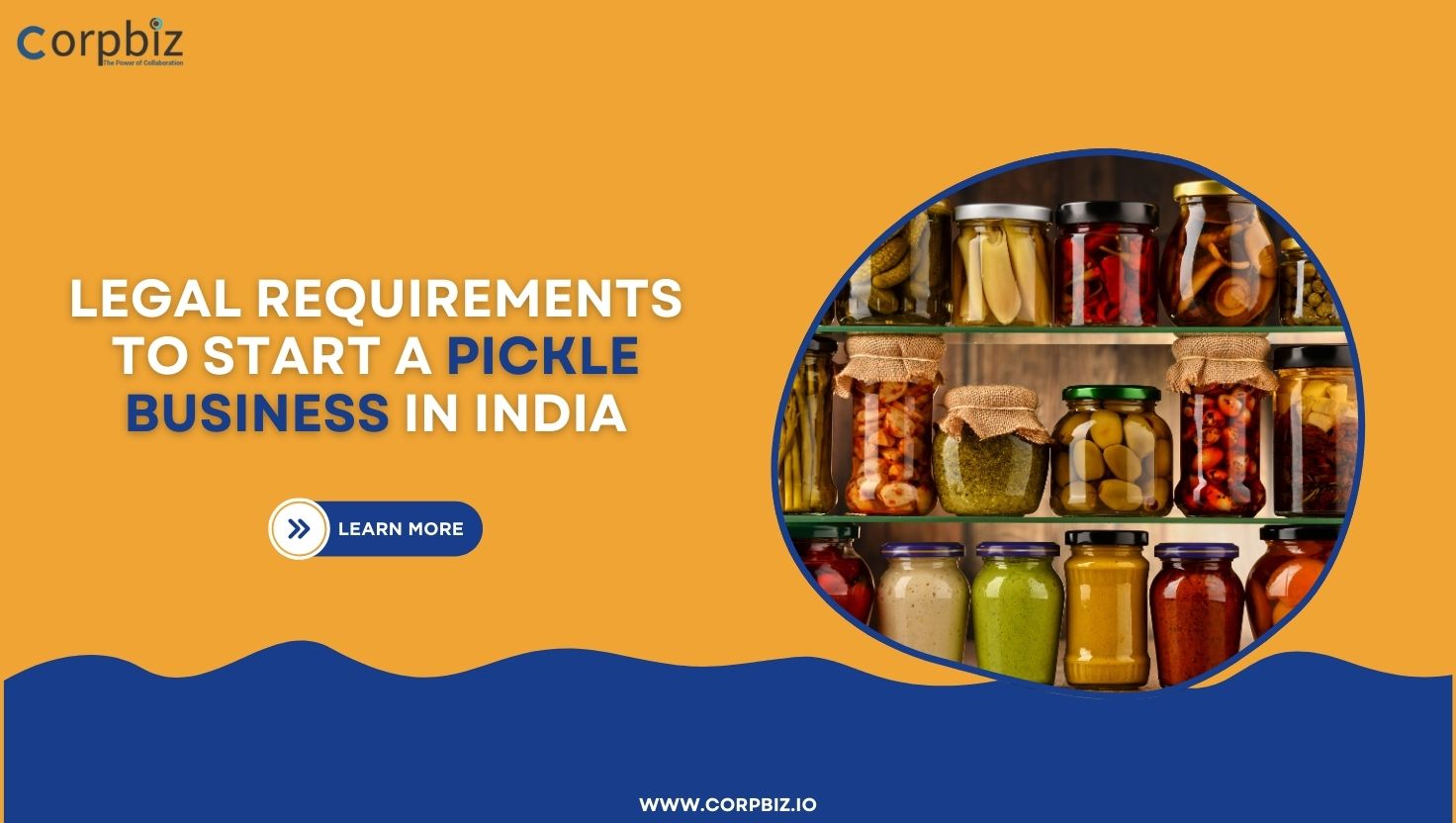Starting a pickle business in India can be profitable, given the country’s love for pickles and traditional flavors. However, before diving into production and sales, we must ensure we comply with the legal requirements. From obtaining an FSSAI license to fulfilling labeling and packaging regulations, every step is crucial to avoid penalties and ensure smooth operations.
In this blog, we will guide you through the legal requirements needed to start a pickle business in India, including the FSSAI registration online process, the food license renewal process, and more.
Understanding the Legal Framework
Before launching our pickle business, we must comply with the Food Safety and Standards Authority of India (FSSAI) regulations. The FSSAI ensures that all food businesses maintain hygiene, quality, and safety standards. This makes obtaining an FSSAI License a mandatory step for all food businesses, including pickle manufacturers.
Apart from the FSSAI food registration, we also need to comply with state regulations, packaging norms, and GST registration if applicable. Let’s go step by step.
Step 1: Registering Our Business
First, we need to decide on a business structure. The common options include:
- Sole Proprietorship – Suitable for small-scale businesses.
- Partnership Firm – Ideal if there are multiple owners.
- Private Limited Company – Best for those planning to scale up in the future.
- Limited Liability Partnership (LLP) – Provides liability protection.
Registering our business ensures legal recognition and helps in opening a business bank account.
Step 2: Obtaining an FSSAI License
Why Do We Need an FSSAI License?
An FSSAI license is mandatory for all food businesses, including pickle manufacturers, to ensure food safety and compliance with quality standards. Without an FSSAI food registration, selling pickles in the market is illegal.
Types of FSSAI Licenses
- FSSAI Basic Registration – For small businesses with an annual turnover of up to ₹12 lakh.
- FSSAI State License – For businesses with an annual turnover between ₹12 lakh and ₹20 crore.
- FSSAI Central License – Required for businesses with a turnover above ₹20 crore or those involved in interstate trade.
How to Apply for FSSAI Registration Online?
- Visit the official FSSAI registration online portal.
- Choose the appropriate FSSAI license type.
- Fill in the application form with business details.
- Upload the required documents (business registration certificate, ID proof, food safety management plan, etc.).
- Pay the applicable fee and submit the form.
- Once approved, we will receive our FSSAI license.
FSSAI License Renewal Online
The FSSAI license is not valid for a lifetime. We must apply for FSSAI License Renewal Online before its expiry to avoid penalties. The food license renewal process involves submitting a renewal application along with updated business details and fees.
Step 3: GST Registration
If our pickle business has an annual turnover exceeding ₹40 lakh (₹20 lakh for special category states), GST registration is mandatory. GST helps in legal compliance and allows us to sell pickles across India.
Step 4: Food Packaging and Labeling Requirements
Our pickle packaging must comply with FSSAI labeling regulations. The following details must be present on our product label:
- FSSAI License Number
- Product Name (e.g., Mango Pickle, Lemon Pickle)
- List of Ingredients
- Net Weight
- Manufacturing & Expiry Date
- Nutritional Information
- Storage Instructions
- Manufacturer Details
Proper packaging not only meets regulatory requirements but also ensures the freshness and longevity of pickles.
Step 5: Obtaining Other Necessary Licenses
Apart from an FSSAI food registration, we may need additional licenses such as:
- Trade License – Obtained from the local municipal corporation.
- MSME Registration – Helps in availing government benefits.
- Import-Export Code (IEC) – Required if we plan to export pickles.
Step 6: Setting Up a Production Unit
Our pickle manufacturing unit must comply with hygiene and safety standards set by FSSAI. This includes:
- Clean and sanitized processing areas.
- Proper waste disposal systems.
- Use of food-grade raw materials.
- Adequate storage facilities to prevent contamination.
Regular inspections ensure compliance with food safety norms.
Step 7: Selling and Marketing Our Pickles
Once our business is legally registered, we can start selling pickles through various channels:
- Local Markets & Grocery Stores – A traditional yet effective way to sell pickles.
- Online Platforms – Selling on Amazon, Flipkart, or our website expands our reach.
- Wholesale & Retail Distribution – Partnering with retailers increases sales.
Marketing through social media and food blogs can also help us attract more customers.
Conclusion
Starting a pickle business in India requires us to follow multiple legal steps, including obtaining an FSSAI license, ensuring proper packaging, and maintaining hygiene standards. By complying with the FSSAI food registration and other regulations, we can build a successful and legally compliant pickle brand.
Whether we are starting small or planning a large-scale operation, legal compliance is crucial for smooth business growth. Don’t forget to apply for FSSAI license renewal online on time to avoid penalties.
FAQs
- Is an FSSAI license mandatory for a homemade pickle business?
Yes, even small-scale homemade pickle businesses need an FSSAI registration online if they plan to sell their products legally.
- How long does it take to get an FSSAI license?
The processing time varies, but usually, a basic FSSAI food registration takes 7-10 days, while an FSSAI state license or FSSAI central license may take 30-60 days.
- What happens if I don’t renew my FSSAI license?
Failure to complete the food license renewal process on time may result in penalties, fines, or even business closure. It’s essential to apply for FSSAI license renewal online before the expiry date.
By following these legal steps, we can ensure that our pickle business runs smoothly, complies with regulations, and thrives in the competitive food industry.










